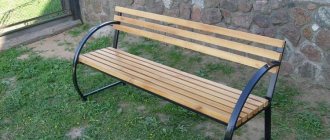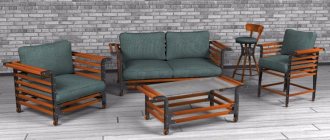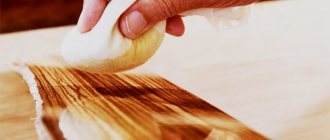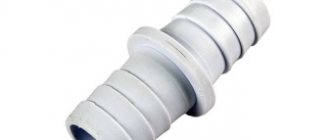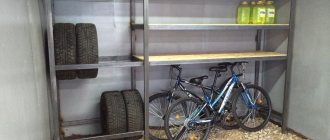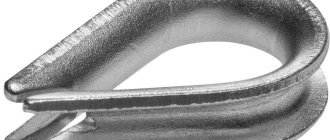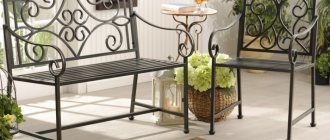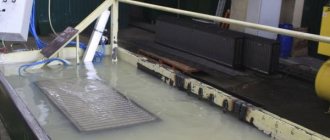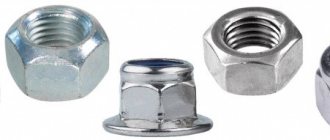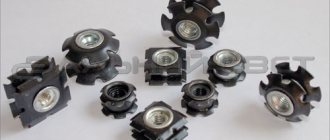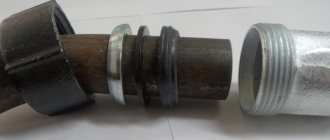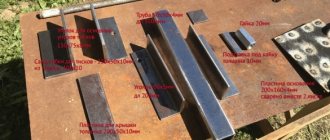To independently manufacture any forged product, you will need a welding machine. To qualitatively weld metal parts together, you need accuracy and minimal skills. Don't expect to do everything perfectly the first time. Therefore, before starting work it is worth assessing your strength. Any handmade product begins with a project. First of all, you need to decide in what style the hand-made forged bench will be made. The shape and color of the forged elements, as well as parts for the seat and back if they are made of a different material, will depend on this. The style must be chosen taking into account how the garden or path where the forged interior items will be placed is designed.
Description and dimensions
The simplest metal bench for a summer house consists of two supports and a seat. For greater comfort of vacationers, a backrest is provided.
Thematic material:
- DIY wooden benches
- DIY furniture for the garden
Benches made of iron without the use of other materials (wood, plastic, etc.) are classified as anti-vandal.
However, it is irrational to install such furniture in the courtyard of a house. After all, metal has tens of times greater thermal conductivity; sitting on it is uncomfortable and even harmful to health. Therefore, it is better to build a country bench according to the formula: metal frame + wooden seat with backrest.
Diagram of a bench made of a profile pipe with a cross-section of 25x30 mm and a wooden beam 60x30 mm.
The dimensions of the bench are selected individually. But there are several rules that it is advisable to take into account:
- The length of the bench is determined at the rate of 0.6 m per person.
- Width – minimum 30 cm.
- Back height – from 30 cm.
- The angle between the seat and backrest is from 105° to 120°.
- The height of the bench is determined by the length of the tibia (to the popliteal fossa). Usually it is 38-45 cm.
If the bench is above 45 cm, then the legs hang down; when below 30 cm, the knees are bent at an acute angle, which impedes blood circulation and manifests itself in the form of an uncomfortable feeling of numb legs. Another nuance that requires attention when designing is the relative position of the backrest and seat. If the angle between them approaches a right angle, then you will have to sit as if you had swallowed a crowbar. From a physiological point of view, this is useful for the spine... But it is inconvenient.
Assembly instructions
Select bench legs and buy a piece of wood for the seat. A quick search online will help you find a place near you that sells the seat! When it comes to bench supports, opt for thick steel legs. You can find a store and order legs with the exact width and height! Attach the legs to the wooden board using furniture screws. To do this, you will have to drill holes in the metal legs and in the board.
After the bench is ready, the wood can be stained with a color stain (there is a wide choice available). The metal legs should be coated with black paint.
Note!
Blinds for gazebos: wooden, metal, bamboo. Instructions for installing blinds yourself
Adding a terrace to your house with your own hands: step-by-step instructions on how to easily and quickly add a veranda or terrace (100 design photos)
How to attach a veranda to your house with your own hands - step-by-step instructions from A to Z + photos of new designs
Instructions if you decide to make a bench without buying ready-made legs:
- It is better to take square pipes and cut them according to the drawings or personal preferences. You should consider who the bench is being created for (for a family with children, only for adults, for tall people, for very overweight relatives).
- Solder the pipes: two large squares serve as bench legs and armrests. A long pipe is soldered between them, onto which a wooden board for sitting will be attached.
- Solder the back of a square pipe (in the shape of a rectangle, plank or other shape) to the squares.
- Screw the board to the seat and cover it with colored stain.
- Paint the metal parts of the bench with black paint. All!
Options for arrangement of wooden parts
There are two ways to place bars - along and across. There is much less work with the longitudinal one, but the transverse one allows you to make a more convenient, homey bench.
Arrangement of boards across – 1, along – 2
Considering that the frame is the same in both cases, additional work is required only for drilling holes and manufacturing wooden elements.
In case of damage, it is much easier to change the transversely located lamellas, and such repairs are cheaper.
Bench protective covering
Wood and metal are processed separately. It is better to use a primer for the frame. Ideally, red lead will be used, which will protect the metal frame from corrosion for decades. Especially when you consider that at the dacha such garden furniture is under the snow for six months.
The wood can simply be painted. But if you first dry it, let it dry for a couple of days, then apply varnish in two layers, then such a coating is guaranteed to protect the wood from environmental influences.
Two benches with a table on a rolled metal frame
In any case, color compatibility and design ideas are important. For example, if the frame is covered with Kuzbasslak, then it is better to varnish the wooden parts, this will emphasize the natural texture of the material.
To make the protection of the bars effective, the treatment is carried out before fixing to the frame.
Varieties
Metal benches are classified depending on various factors. According to the material:
- benches made of metal and wood;
- metal structures without wooden or plastic inserts;
- plastic benches;
- combined designs.
Depending on the frame:
- From metal corners. Simple metal structures, the seat in which is made of boards.
- From profile tubes. Pipes are bent at different radii.
- Connection of individual forged elements. Ready-made parts can be purchased in specialized stores.
Another division - with or without a backrest.
Bench made of metal and wood (Photo: Instagram / fram.rpk)
Raw materials for frame
Depending on the type of metal base, the following types of garden benches are distinguished:
- forged;
- from a professional pipe;
- from the corners;
- from scrap metal.
Materials for manufacturing: profile 25x25 - 6 meters, timber 60x20 and 80x40, 5 meters each.
Forged benches
They belong to the category of luxury furniture, which adds solidity to the garden plot and increases the status of the owner. Forged items belong to two groups:
- machine (cold) forging;
- artistic (manual).
In the first case, the finished product is welded from elements subjected to machine processing (casting, stamping, rolling). To create a garden bench from such components, you need a drawing on which all the parts and their locations are marked. The elements are fixed by welding. Then the seams are cleaned, sanded, and the finished product is primed. Such a bench for a summer house will cost 5 times less than one made by artistic forging.
But it’s impossible to make a hand-forged shop without special skills. The sidewalls can be purchased separately and the seat can be fixed to them. On the one hand, this is a good solution, because you can independently adjust the length of the bench, but on the other hand, such a pleasure is expensive. It takes a blacksmith a whole day to make one element. This is reflected in the price. A forged outdoor bench is a very expensive thing.
But we hasten to note that if you meticulously, without deviating one iota from the drawing, assemble a bench from machine forged elements, then carefully process and paint the welds, then 99% of people will not distinguish such a garden bench from a more expensive one forged by hand.
Product care technology
Regardless of the quality and methods of processing the material, a forged garden bench requires some care. But it is worth saying that the storage rules are quite simple. One of the most important is the need to remove dirt and moisture from the bench. Not only does aesthetics depend on this, but also quality. Moisture will sooner or later lead to corrosion of the material.
From time to time, a country decor element needs to be treated with anti-corrosion substances. This can be a special product or ordinary paint. The most affordable and fairly reliable way to protect metal from corrosion is to use car wax. It repels dirt and moisture from the surface of the bench, thereby preventing them from accumulating in vulnerable parts of the structure. Even after 5 years of active use, the forged bench will look great.
In winter, as well as at the end of autumn and beginning of spring, the metal bench must be moved to a dry place. If it is impossible to move it, the bench should be covered with several layers of waterproof coating.
YOU NEED TO MAKE SURE THAT SNOW AND WATER CANNOT PENETRATE INSIDE.
Bench made of profiled pipe
This is the most convenient material to work with. To make the frame of the bench, a profile pipe of square or rectangular cross-section is used.
Its advantage is its high resistance to physical impact, ease of assembly and low price.
A pipe with a wall thickness of 2-3 mm is enough to support a weight of up to 300 kg. You just need to correctly draw up a drawing and select elements from wood of the appropriate thickness.
You can bend parts made from professional pipes yourself. Before bending, the pipe is tightly filled with fine sand. And the finished structural elements are fixed either by welding or bolts.
Photo: process of assembling and welding a frame from a profiled pipe
Special requirements are placed on fasteners that connect wooden elements. They should have rounded hats to prevent damage to clothes.
Hanging bench for rest
It looks like there is a hook screwed into the ceiling. On it hangs a bench suspended from ropes. If your vision of the perfect summer involves sitting on the porch with a cold lemonade and a good book, you'll want to add a fun hanging relaxing bench to the equation. With just a few metal pipes, canvas fabric, strong rope, and a support hook, you can build this stylish rocking bench in no time. It's the perfect place to relax in the summer, read magazines and sip lemonade.
What you need:
- 3 metal pipes 1.5 meters long and about 10 cm wide;
- two wooden sticks 5 cm wide and 1.5 meters long;
- rope (make sure the weight limit is at least 300 kg);
- hook (make sure the weight limit is at least 300kg);
- canvas, which is used as a seat;
- drill;
- tape measures, scissors.
How to do it:
- Cut five metal pipes 1.5 meters long and about 10cm wide. If you want more color contrast from the canvas, paint all five metal pipes.
- Cut a piece of thick fabric measuring 2 x 1.3 meters. Fold the shorter edge of the fabric over and stitch so that you can thread the pipe through. Do the same on the other side of the short edge of the fabric. Thread the two tubes into the fabric (at the short edges). You should have a seat: fabric with pipes inserted along the short edges (one pipe from each edge 1.3 meters). Now, for the stability of the structure, we thread two more wooden pipes perpendicularly into the metal pipes. To do this, you need to make holes in the metal pipes, stepping back 10 cm from the edge. We insert a wooden stick into these holes from the left side. We screw it to a metal rod. Now do the same on the right side. The seat is ready. At the top and bottom there are metal pipes threaded through fabric, and on the sides there are wooden sticks for stability of the structure. Now the seat needs to be hung.
- Drive a metal hook into the ceiling.
- Hang the rope in the hook: thread the 6 meter rope in the middle into the hook. The ends should be 3 meters on each side.
- Tie a third metal stick under the hook: tie ropes down from the hook at the ends of the stick. Place the ropes down and hang the top of the seat around the edges.
- Tie the lower part of the seat on each side to the third stick under the hook. All is ready. The bench is ready.
- Trim the excess rope (you can leave some rope hanging again if you like). The ends of the hanging rope can be unraveled and fluffed for decoration.
Benches from the corner
Working with this material is as convenient as working with corrugated pipe; bolting is easy. It's just more difficult to bend the corner. The drawing for making a basic bench can be sketched by hand, the main thing is to maintain symmetry and maintain the dimensions.
At the dacha, such furniture looks organic, especially if you paint it in the same style as the surrounding objects.
Scrap metal bench
This is the most creative direction in making garden furniture. There can be no exact drawings here. Only general design ideas limit the owner’s imagination.
Photo: decorative bench made of sheet metal
You can use any metal that comes to hand. The main thing is to clearly understand what you want to see in your dacha - a practical bench or a futuristic miracle that will attract the eyes of guests and passers-by.
Technical requirements
Metal benches, which are manufactured by industrial enterprises and furniture workshops, must meet a number of requirements:
- high strength, wear resistance, durability, reliability;
- smoothness of surfaces.
- environmental friendliness, the material should not emit harmful substances during operation;
- resistance to temperature changes, prolonged exposure to moisture and chemicals.
To fulfill the last requirement, it is necessary to use anti-corrosion compounds in the form of powder paint, primer, or liquid. Without additional treatment, the metal will begin to rust in the area of connections, cuts, and damage.
